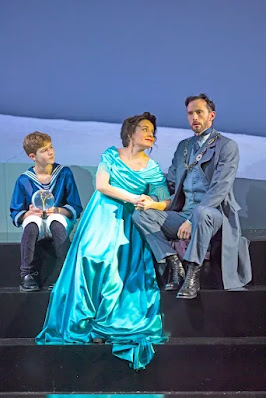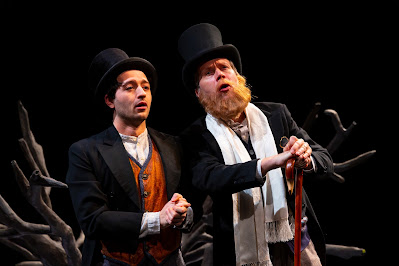By James V. Ruocco
One of the more complicated, odd and unusual plays in the Shakespearean repertoire, "The Winter's Tale" is often conceptualized as "a problem play of sorts" because its narrative tone doesn't quite fit comfortably into a single category or storytelling genre.
Is it a dark and rambling tragedy?
Is it a comedy?
Is it meant to be a pastoral romance with a happy ending?
Is it pure Elizabethan drama with a mystical, magical resolution?
The answer: All of the above.
A work that is oft neglected and rarely performed, "The Winter's Tale," nonetheless, is an abstract piece of theatre, rich in concept and intuition, dominated by a complex plotline of two halves - darkness and jealousy; comedy, discovery and festivity - that gives way to an immersive, full-on work of intensity, illumination and lighthearted formality and playfulness.
At Hartford Stage, it is deftly told with vibrant abandonment and chilling confrontation, nicely cemented in spectacle, emotion, joyfulness and authority.
It is elegant.
It is lyrical.
It is dangerous.
It is surprising.
It is powerful.
It is fiery.
It is glorious.
More importantly, this production of "The Winter's Tale" marks Melia Bensussen's first time Shakespearean directorial effort at Hartford Stage.
And right she is.
The plot of this Shakespearean play is an interesting one, counterbalanced by many dancing ideas, twists, theories, tilts and determined exploration.
Leontes, the handsome, powerful and respected king of Sicilia, is driven quickly into madness once he learns of his wife Hermione's pregnancy. After becoming paranoid about her fidelity, he imprisons her and puts her on trial for adultery with no evidence other than his own suspicions.
Once she gives birth in captivity to her new daughter Perdita, the child is exiled to a distant shore where she is, by a strange twist of fate, rescued and adopted by a shepherd and his son. In Sicilia, Mamillius, the king's young son, dies soon after from the distress of his mother's arrest. Hermione, in turn, collapses and is declared dead.
As "The Winter's Tale" continues, the next segment of the play, picks up the story, 16 years later and changes from a dark, snowy winter to the celebratory season of spring. Here, Perdita has grown up and fallen in love with Florizel, the son of Leontes best friend Polixenes, the king of Bohemia who, years earlier was suspected of bedding Hermione, Leontes, deceased, fallen queen.
There's music. There's dancing. There's singing. There are folk melodies. There are reunions. There are disguises. There are engagements. There are surprises.
But alas, another change in the story brings Perdita back to Sicilia to meet her real father and enjoy a reconciliation with her family and the king's court.
However, before "A Winter's Tale" concludes, a beautiful and realistic statue of Hermione magically comes to life. The music sounds, everyone is reunited, and, in true Shakespearean fashion, they all live happily ever after.
The chaos, the tragedy, the surprise and the merriment of Shakespeare's story spins and races with poetic justice, thrust and comprehensive cleverness, all gussied up to perfection under the handsome staging techniques and employment, fashioned by Melia Bensussen, the play's director. It's a richly creative effort and process that pinpoints the human truths, historic echoes and trailing individualism of the Bard's writing, his intelligence, his gift for characterization, his swots of exposition and the enormity of his glib, complicated, often pleasurable plotting.
Directorially, Bensussen embraces the production's intoxicating mix of ingredients, thoughts and ideas with confidence, rationality and trafficking that validates her ingenious grasp of the material, its progression and confrontational sensibility. As storyteller, she doesn't waste a moment. She takes chances. She pauses. She breathes. She stands back. She creates.
Here, everything is stamped, steadied and delivered with seamless approximation that befits her telling, her interpretation, her staging, her cue cards and her great library of equation and fruition. As "The Winter's Tale" evolves, Bensussen taunts, titillates and entices both actor and audience with inspirational, atmospheric blocking maneuvers, patterning, positioning and exchanges concurrent with works by Henrick Ibsen, Anton Chekhov and Ingmar Bergman.
It's a creative choice fused with thrilling ambition, surreal experimentation and definitive output. One of the pleasures of this production is watching how it all comes together scene by scene and act by act, justly illuminated by Cameron Anderson's atmospheric set design, Evan Anderson's moody lighting cues, Whitney Lochner's gorgeous period costuming and Pornchanok Kanchanabanca's immersive original music and sound design.
"The Winter's Tale" stars Nathan Darrow as Leontes, Jamie Ann Romero as Hermione, Omar Robinson as Polixenes, Jeremy Webb as Shepherd, Ana Laura Santana as Perdita, Daniel Daviila Jr. as Florizel, Lana Young as Paulina, John Maddaloni as Clown (Shepherd's Son) and Pearl Rhein as Autolycus.
As Leontes, Darrow crafts a particularly maddening, centered dramatic portrait that is both rich in execution, style and interpretation and performance. Rhein, as trickster and medieval poet-musician Autolycus, own every scene that she appears in. In the role of Paulina, a strong-willed, outspoken Sicilian noblewoman, Young offers a brilliantly focused, driven characterization. Romero is rife with anger, rage and confusion as the unjustly accused Hermoine. Webb, as the goofy and funny Shepherd, bristles with appropriate comic flair and fancy.
An ambitious production, meticulously told through the adventurous eyes of director Melia Bensussen, "The Winter's Tale" addresses the emotional weight of William Shakespeare's rapidly progressive tale with style, imagination, elegance and impact.
It is a feast for the eyes - stunningly produced and designed - performed by a magnificent team of players, all of whom are well versed in the Bard's beautifully textured trappings, character development, hefty queries, reveling and combative drama.
This is must-see theatre afresh with wonder and celebration that breathes new life into Shakespeare's rarely performed centuries-old play text.






































